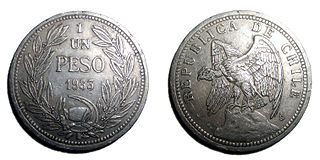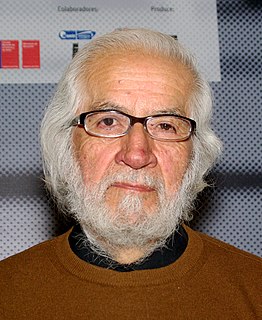Related Research Articles
Premio Nadal is a Spanish literary prize awarded annually by the publishing house Ediciones Destino, part of Planeta. It has been awarded every year on 6 January since 1944. The Josep Pla Award for Catalan literature is given at the same ceremony.
Sergio Villalobos Rivera is a Chilean historian, and Chilean National History Award in 1992. Among his most significant works is the Historia del pueblo Chileno.

The economy of Chile has shifted substantially over time from the heterogeneous economies of the diverse indigenous peoples to an early husbandry-oriented economy and finally to one of raw material export and a large service sector. Chile's recent economic history (1973–) has been the focus of an extensive debate from which neoliberalism acquired its modern meaning.

Deportes Antofagasta is a Chilean football club based in the city of Antofagasta currently playing in the Campeonato Nacional. The club's home stadium is the Estadio Bicentenario Calvo y Bascuñán, which has a capacity of 21,178.

The National Party or Montt-Varist was a Chilean political party formed in 1857 as a split from the Conservatives by the supporters of President Manuel Montt and Interior Minister Antonio Varas. The National Party had a liberal-conservative ideology and was primarily supported by middle-high businessmen, bankers and journalists. The Welsh-born Edwards family was a bigger financer of the party, along with the aristocratic Balmaceda, who was linked to the Liberal Party. The party never was more than an influential third party, and since the late 1910s its influences declined considerably, stopping from participating to national elections after 1924, finally merging into the United Liberal Party in 1933. The monttvarista National Party is not to be confused with the National Party formed in 1966.
The National Prize for Arts and Sciences is awarded annually by the Government of Mexico in six categories. It is part of the Mexican Honours System and was established in 1945. The prize is a gold medal and 520,000 pesos.

Gabriel Salazar Vergara is a Chilean historian. He is known in his country for his study of social history and interpretations of social movements, particularly the recent student protests of 2006 and 2011–12.

The Destruction of the Seven Cities is a term used in Chilean historiography to refer to the destruction or abandonment of seven major Spanish outposts in southern Chile around 1600, caused by the Mapuche and Huilliche uprising of 1598. The Destruction of the Seven Cities, in traditional historiography, marks the end of the Conquest period and the beginning of the proper colonial period.
Sergio Esteban Vélez Peláez is a Colombian writer, professor and journalist. He won the Premio Nacional de Periodismo Simón Bolívar 2010 », the Premio Internacional de Periodismo José María Heredia 2010 .) and the Premio Cipa a la Excelencia Periodística 2012. The poet Olga Elena Mattei says that Vélez represents the Andean aspect of the contemporary Colombian poetry. Vélez is a Communicator of the University of Antioquia, Colombia.

Mario Andrés Hamuy Wackenhut is a Chilean Astronomer and Professor of Astronomy at the University of Chile and Cerro Calan Observatory. He is well known for his observational work on all classes of supernovae, especially the use of Type Ia and Type II supernovae as measures of cosmic distance.
In Chilean historiography, Colonial Chile is the period from 1600 to 1810, beginning with the Destruction of the Seven Cities and ending with the onset of the Chilean War of Independence. During this time, the Chilean heartland was ruled by Captaincy General of Chile. The period was characterized by a lengthy conflict between Spaniards and native Mapuches known as the Arauco War. Colonial society was divided in distinct groups including Peninsulars, Criollos, Mestizos, Indians and Black people.

In Chilean historiography, the wheat cycle refers to two episodes of booming wheat exports and related changes in society and agriculture. The first cycle occurred from 1687 to the independence wars and was caused by heavy demand in Peru. The importance of wheat had led the 18th century in Chile to be labelled the wheat century.

Jorge Manuel Pinto Rodríguez, is a Chilean historian. He is known in Chile for his study of the history of Araucanía, social history and demography. In 2012 he gained the Chilean National History Award.
The National Prize of Chile is the collective name given to a set of awards granted by the government of Chile through the Ministry of Education and, as of 2003, by the National Council of Culture and the Arts. They are presented by the President of the Republic at an official ceremony held at La Moneda Palace.
The National Prize for Education Sciences was created in 1979 and is awarded every two years, in accordance with Law 19169 of 1992. It is part of the National Prize of Chile granted by the Ministry of Education.
The National Prize for Natural Sciences was created in 1992 as one of the replacements for the National Prize for Sciences under Law 19169. The other two prizes in this same area are for Exact Sciences and Applied Sciences and Technologies.
The National Prize for Humanities and Social Sciences was created in Chile in 1992 under Law 19169. It is granted "to the humanist, scientist, or academic, who has distinguished himself for his contribution in the field of Human Sciences". The history field has its own National Award.

Agriculture in Chile has a long history dating back to the Pre-Hispanic period. Indigenous peoples practised varying types of agriculture, from the oases of the Atacama Desert to as far south as the Guaitecas Archipelago. Potato was the staple food in the populous Mapuche lands. Llama and chilihueque herding was practised by various indigenous groups.
[Chile] is rich in pastures and cultivated fields, in which all kind of animals and plants can be breed or grown, there is plenty of very beautiful wood for making houses, and plenty of firewood, and rich gold mines, and all land is full of them...

Jorge Marcos Baradit Morales is a Chilean writer, author of the bestselling popular history trilogy Historia secreta de Chile, politician and podcaster.

Julio Pinto Vallejos is a Chilean historian. He is known in Chile for his study of social history and interpretations of social movements. In 2016 he won the Chilean National History Award. He is a member of the editorial board of LOM Ediciones.
References
- ↑ "Premio Nacional de Historia" (in Spanish). Biblioteca Nacional de Chile. Retrieved 6 September 2015.